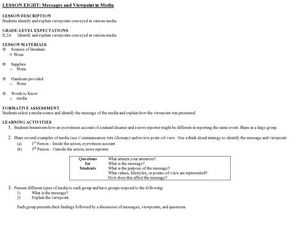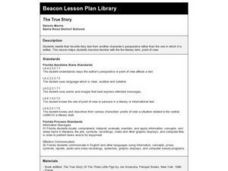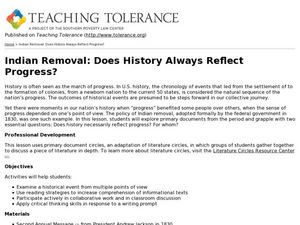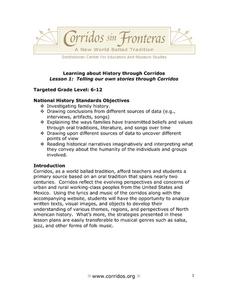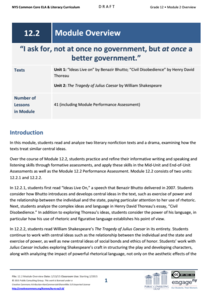Curated OER
Determining Author's Point of View: The Sneeches
Determine the author's point of view in a text. Young readers read Dr. Seuss' The Sneeches and identify the author's purpose in the story. They identify persuasive techniques in writing, asking and answering questions to better...
Curated OER
Elements of Fiction
The metaphor of a pot of soup and a series of colorful templates remind young writers of the elements that make for a rich story. Pepper the plot with carrot/character, potato/point of view, corn/conflict, tomato/theme, and season with...
Curated OER
Messages and Viewpoint in Media
Explore media point of view. In this literacy and current events instructional activity, pupils identify examples of first and third person point of view in media articles. They analyze examples of media, interpret the messages, and...
Curated OER
Recognizing a Message's Point of View
Pupils study the physical, mental, and social health benefits of regular exercise while attempting to recognize the point of view of media messages. They read an article and discern ways in which they can make regular exercise a part of...
Curated OER
Slavery: Acts of Resistance
Historical accounts of various events have proven to differ depending on the point of view of the person documenting the event. Learners read and analyze two first person accounts of acts of slave resistance seen at a southern...
Curated OER
Comprehension Questions: The City of Ember, Chapter 20
Comprehension questions for the last chapter of Jeanne DuPrau's book The City of Ember assess factual recall, sequencing skills, and inference about the text. Note: One question about point of view is based on a sentence not related to...
Media Smarts
Teaching TV: Learning With Television
As part of a series of resources focused on the influence of television, elementary students watch an educational program and identify the information presented and analyze the point of view from which the information is...
Curated OER
When Art Conveys a Political Message
Twelfth graders learn art is an effective way to convey a political message. They learn how political messages are created to convey a message. They analyze a piece of artwork and then write a short paragraph from the point of view of...
Curated OER
The True Story
What's your favorite fairy tale? Seventh graders rewrite their favorite fairy tale from another character's perspective rather than the one in which it is written. This lesson helps readers become familiar with the literary term point of...
Missouri Department of Elementary
Communicating with I-Messages (2/2)
Class members read a handout to learn about using I-Messages—honest statements that begin with I to get their points of view across. Next, learners practice using I-Messages with partners to better communicate without hurting...
Curated OER
Where are your borders?
Students explore the meaning of borders, both real and symbolic. After viewing film footage and visiting poetry websites, they develop their own point of view. To express their perspective, they are to write a journalism poem, or...
Curated OER
The Metamorphosis: Concept/Vocabulary Analysis
Historically, Franz Kafka's The Metamorphosis has been difficult for many readers to grasp. From the difficult translation issues to the complex plot and themes, the novel's message and story can be lost when learners...
Curated OER
Political Cartoons: Finding Point of View
Young scholars examine political cartoons. In this colonial America lesson, students analyze political cartoons pertaining to the Stamp Act.
Curated OER
Wisdom of the Ages
Students reflect on the different stages of life that humans pass through. They challenge common sense assumptions and critically engage media representations of people at different ages. They determine that media have embedded values...
Curated OER
Narrative of the Life of Frederick Douglass by Frederick Douglass
Imagine what it was like to be a slave in the United States in 1845. Eighth graders are given an opportunity to experience life from the point of view of Frederick Douglass as they read and discuss an annotated passage from Narrative of...
Curated OER
Ad Busting
Debunk advertising myths by creating an opposing image. First, find an ad with a persuasive and emotional pull. Once you have identified the message, create a counter-advertisement that shows the opposite message. For example, if an ad...
Curated OER
Indian Removal: Does History Always Reflect progress?
Students explore the idea that progress for some might not mean progress for all. In this Native American lesson, students recognize different viewpoints about historical events through the study of primary documents. Students decipher...
Curated OER
Passing Down Family History Through Oral Tradition: Corridos
Students create and perform Corridos which are oral tradition ballads. In this Passing Down Family History Through Oral Tradition lesson, students interview family members using a predetermined list of questions. In addition, students...
EngageNY
Connecting Ideas in Primary and Secondary Sources: What Led to the Attack on Pearl Harbor?
Let's make some sense of those thoughts! Scholars continue thinking about the different perspectives on Pearl Harbor. They analyze quotes from War in the Pacific, Day of Infamy, and Fourteen-Part Message. Readers tape each quote to chart...
EngageNY
Studying Conflicting Information: Varying Perspectives on the Pearl Harbor Attack, Part 2
Scholars take another look at Japan's Fourteen-Part Message. They then take turns adding ideas to sentence starters to create ideas about the different perspectives of government. To finish, groups mix and mingle to share their sentences...
EngageNY
Grade 12 ELA Module 2
The second module in a series for high school seniors focuses on tracking the central idea of a text across genres and from multiple author and character perspectives. Twelfth graders read a speech by Benazir Bhutto entitled "Ideas Live...
Curated OER
What's Missing? Making Room for Multiple Perspectives
Students identify missing characters from a text, particularly a school text. They increase critical thinking by supplying missing perspectives in a text an build empathy through surveying different points of view. They reflect on the...
Benjamin Franklin Tercentenary
From Ben’s Pen to Our Lives
What would Ben do? Jumping off from the pseudonymous letters Ben Franklin fooled his older brother into publishing when he was still a teenager, young literary lovers dive into acting, writing, and addressing a local issue with wit and...
Curated OER
Child Adolescent Sexual Development: Infant and Preschool
This is a very comprehensive lesson on infant and preschool sexual development. It says only one class period, but I think it could be several days worth of materials to cover. The point of view taken here is from that of being a parent....




